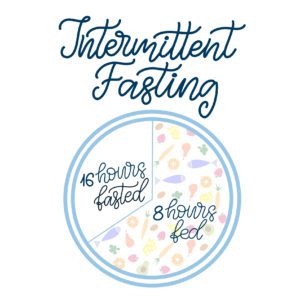The Basics of Intermittent Fasting
March 2, 2020
Intermittent fasting has been ebbing and flowing in popularity over the past few years.
What is it?
Intermittent Fasting is a dieting method where people will refrain from eating for a specific time frame and there aren’t generally any foods that are off limits. Commonly, individuals will elect to withhold food for a specified number of hours, allowing themselves to eat for only a certain time frame. Other methods involve eating every other day or not eating for two days out of the week and then consuming their typical diet the remaining five days.
Clinical Studies:
There have been mixed results regarding body composition changes.
Spoiler alert: based on data gathered from individuals observing Ramadan, a 13 hour fast overnight (rather than during the day) is the most ideal time frame to go without food.
People tend to make poor food during the evening hours when the brain is tired. Avoiding late-night snacking is in the best interest of most individuals. Additionally, it appears to have a beneficial impact on blood glucose, in both diabetics and non-diabetics resulting in weight loss.
One study on overweight and obese subjects, published in the International Journal of Obesity indicated a different outcome: two different types of intermittent fasting techniques were compared to the standard low-calorie diet. Results indicated that those doing intermittent fasting had more muscle mass loss than the individuals on a low-calorie diet, they did lose weight, but it wasn’t the right weight to lose.
Losing a significant amount of muscle is unhealthy; not only does muscle loss lower metabolism, it causes a loss of balance, performance and reduces endurance.
Unexpected Outcomes:
Many individuals on time-restricted diets begin to develop an unhealthy relationship with food, obsessing over it from the moment they wake up to the time they finally start eating; which is frequently after a long day at work.
Portion control and healthy food choices are generally not a concern for individuals when they are on this diet; however, when severely limiting the hours that food can be consumed to say a 3-5 hour window, daily food binges often occur.
If you are highly stressed, suffer from depression, or have a history of eating unrelated to physical hunger, take warning: intermittent fasting may be a very poor choice for you.
Take Away:
A longer time frame to withhold food isn’t necessarily better than the recommended 13 hours; additionally, if you are going to restrict food, do so at night when your body doesn’t need calories.
Consider the times when you eat and what you’re electing to eat. Do you have a history of emotional eating, anxiety or depression? Will avoiding food be in your best interest or should you perhaps consider working on your relationship with food, or cleaning up your diet a bit; you may see weight loss without a fad diet.





